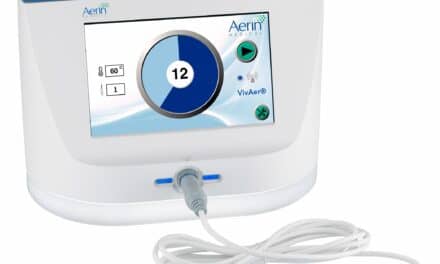For users of its SleepIQ technology beds who opt in, bed maker Sleep Number has launched a new consumer-based research project aimed at identifying underlying physiological warning signs of health issues. SleepIQ uses sensors in Sleep Number beds to track sleep and connects to an app, where users can view daily SleepIQ score, track activities, and more. The new sleep science research capability means that sleepers will answer periodic surveys about their health. This self-reported health history will be analyzed alongside anonymized and aggregated sleep and biometric data.
The data will contribute to Sleep Number’s insights on sleep’s impact on holistic health—and possibly even predict future health trends—and inform the development of new products, services, and partnerships to advance the science of sleep. The first phase of the study beginning in fall 2020 will focus on retroactively examining the sleep data of individuals who reported having COVID-19. This study, approved by an institutional review board, could lead to identification of bio-signals that predict the onset of COVID-19 before any symptoms appear.
“Our longitudinal sleep data once again propelled us to take big steps forward to improving overall health,” says Annie Bloomquist, Sleep Number chief product officer, in a release. “Last year, our digital platform proved that 360 smart bed users who use the features and insights of their beds get up to 100 hours more quality sleep per year—which is meaningful to health outcomes. With our new Sleep Science Research initiative, we hope to unlock insights into population and sleep health patterns and find new ways for individuals to take significant and proactive steps to improving their wellbeing.”
Additionally, Sleep Number unveiled a new online resource called the Sleep Science Portal, to support sleep science advancements and real-time sleep data. Portal users can find information pertaining to sleep science, insights on sleep, news from Sleep Number’s scientific advisory board, technology updates related to the company’s digital health platform, recent research findings and more. Soon, the portal will also feature real-time insights on SleepIQ data, with context that helps the user understand their data and underlying trends that may impact sleep. This will be the first time that Sleep Number’s data—which will be aggregated and anonymized—will be available for public viewing.
Continuing to build upon the recently-announced collaboration with Mayo Clinic, Sleep Number is also funding a new study in conjunction with Virend Somers, MD, PhD, director of the Cardiovascular Facility and the Sleep Facility within Mayo Clinic’s Center for Clinical and Translational Science, and a member of Sleep Number’s scientific advisory board. The Excessive Sleepiness Study will explore the triggers of sleepiness (such as sleep efficiency, sleep duration, arousals, apnea, and more) and the potential contribution of these triggers and of sleepiness itself to adverse outcomes—cardiovascular events, renal failure, development of cancer, and death.
“Sleepiness is increasingly prevalent in our fast moving, high tech society, connected across countries, continents, and time zones,” says Somers in a release. “This commitment by Sleep Number will enable the analysis of thousands of sleep studies to help us better understand the mediators and implications of sleepiness in our patients.”
Sleep Number has also rebranded its Silicon Valley research facility as Sleep Number Labs. After being acquired in 2015, Sleep Number Labs—formerly known as SleepIQ Labs—launched sleep tracking technology that led to the a commercialized smart bed, the 360 smart bed. As the company’s center of technology and research, Sleep Number Labs delivers science-based software innovations that it says will “lead to effortless, quality sleep.”
“Sleep Number Labs is our technology incubator and primary generator of sleep science innovations,” says Bloomquist. “In the land of the greatest technologists—Silicon Valley—our rebranding to Sleep Number Labs signals the dominant role that technology and innovation play in our customers’ experience, as well as the invaluable place they hold in our company. By leveraging our talented team, technology insights and research, we will further define and elevate what customers can expect from their sleep experiences and deliver value to our shareholders.”
New Data that SleepIQ Tech Now Collects
Earlier this year, Sleep Number announced its scientific advisory board, an interdisciplinary group of physicians, clinicians, and researchers with expertise in sleep science and health. Chaired by Eve Van Cauter, PhD, professor in the Department of Medicine at the University of Chicago, and working closely with chief product officer Bloomquist, the board is providing expert counsel to Sleep Number as it analyzes data to innovate new sleep health solutions. Early results of these efforts led to the development of several new sleep innovations.
Newly available on August 9, SleepIQ technology now also tracks an individual’s nighttime heart rate variability (HRV), a measure of the variation of time between each heartbeat. Daytime HRV is heavily influenced by inputs from environment, emotions, and physical factors. By tracking HRV at night, most external factors are absent, providing a more accurate measure, Sleep Number states, adding that high HRV, for example, may indicate greater cardiovascular fitness and physical recovery ability. “360 smart bed sleepers will benefit from understanding how their nighttime heart rate variability impacts their activity level and energy each day,” the company states.
Released in April 2020, “Sleep Circadian Insights” automatically track sleep and wake times for each sleeper in the SleepIQ platform application. Using artificial intelligence, SleepIQ technology learns a sleeper’s patterns and provides guidance to optimize sleep and wake times, such as what time of day they are most alert or their optimal times to work out and go to bed.
“Human immune function is profoundly modulated by sleep and circadian rhythms,” says Van Cauter in a release. “Studies strongly suggest that insufficient sleep, poor sleep quality or irregular day-to-day timing of sleep may adversely affect immunity.”
Sleep Number’s monthly “sleep wellness reports” are intended to provide an overview of personalized insights, highlighting sleep health, circadian stability, and respiratory and cardiovascular health via HRV. Initial Sleep Number research indicated that 8 out of 10 users found the reports valuable, and 40% of those users changed sleep-related behaviors based upon information provided in the reports, such as going to bed earlier or changing their pre-bedtime routine. This feature was also added in April 2020.





